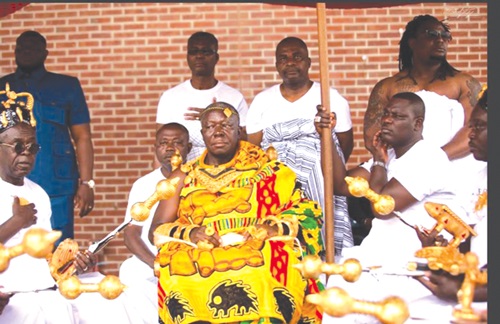The other day, a young man I know quite well sent me an invitation to his wedding next month by WhatsApp and followed it up with a request for an appointment so he could bring the physical card to me at the office.
I was delighted for him and gave him my word that I would attend. However, I felt it was a rather unnecessary waste of time and money for him to come to the office as the e-version contained all the information I needed, and that I would probably end up misplacing the card anyway.
He insisted that it was a matter of the respect he had for me. I was flattered but still saw no point. Eventually, I had to indulge him and we made an appointment.
Traditional protocol
I recounted my experience on my Facebook wall, with interesting feedback by way of support for my young friend. The predominant view was that whilst it was appropriate for him to invite his peers via social media, in the Ghanaian context, it was disrespectful to invite an older person, or a person of some standing, to an event through the same means.
This got me thinking, and the more I thought about it, the more the balance between the convenience of technology and the maintenance of certain traditional protocols struck me.
I realised, for instance, that the family of a prominent person usually takes the trouble to travel to the presidency to formally inform the President of his or her death. Also, inviting a traditional ruler to an event involves quite an intricate level of protocol.
It usually requires a delegation to attend the palace (with drinks and other items, of course) to announce the event and to extend the invitation. When the chief has honoured the invitation and graced the occasion with his presence, another visit to the palace (again with drinks and other items) to formally say thank you is mandatory.
In the aftermath of my father’s passing in 2015, we were obliged to interact thus with the Kumawumanhene, given that my father was one of his sub-chiefs. The richness of the language employed on both occasions was a marvel to listen to – complete with proverbs; the palm oil with which words are eaten, as Chinua Achebe deftly puts it.
At almost every funeral I have attended, the receipt issued when one makes a donation clearly has ‘thank you’ inscribed on it. Yet, beyond this, when the donation is announced at the funeral grounds, as is usually the case, particularly during Akan funerals, a delegation (usually of women), referred to as the ‘aseda’ group, is quickly dispatched to the donor to say thank you and shake hands in appreciation.
The post-funeral ‘thank you’ process requires physical visits to some select individuals. Phone calls, text messages or WhatsApp messages to them? Inconceivable. I suppose the notion is that if a person of such standing took the trouble to attend the funeral, it is only proper that one reciprocates by going to their home or office to say thank you in person, even if appreciation was expressed at the funeral.
In Akan societies, a person rendering appreciation in person may add ‘If at dawn tomorrow you hear the cock crowing, it is me saying thank you’, making the whole appreciation process rather multi-layered and perhaps a tad effusive.
Societal glue
In much earlier times when communities were more compact and, therefore, everyone was within easy reach and there was no technological alternative, it made a lot of sense to turn up in person to extend invitations to events and subsequently to say ‘thank you’.
In today’s busy world, with technology at our fingertips and people scattered all over, is it really an efficient use of time and resources to employ a belt-and-braces approach to invitations by sending e-versions and then following them up with the real thing?
Should we not move into the 21st century in its entirety, together with its conveniences? Not so fast, I say. Whatever technological marvels there are, a society is held together by the glue of its unique customs, conventions and traditions that make it wholesome and uniquely organic.
Technology does have its limit and can never replace the warmth of human interaction – indeed, too much of it can render a society stale and staid. If respect for older people and the highly placed is something we rightly cherish as part of our social fabric, then perhaps the inconvenience of physical visits in these situations as an expression of those values is a small price to pay.
I am looking forward to the young man’s visit. We will, of course, have a chat about his wedding, with a few words of encouragement thrown in for good measure. If he sees me as a ‘big man’ worthy of a physical visit to extend an invitation, I am definitely not complaining. Maybe it is a sign that I have arrived at the table of elders, finally.
Rodney Nkrumah-Boateng,
Head, Communications & Public Affairs Unit,
Ministry of Energy.
E-mail: rodboat@yahoo.com

